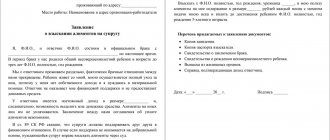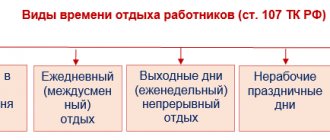Nowadays, many employers, trying to save on taxes, pay their employees black wages or wages “in an envelope”. This is quite risky for the employee, because it may happen that upon dismissal or at another time, the employer will stop paying him the due amount. In this regard, an employee may have a question: what to do if the employer does not pay unpaid wages?
It is possible to return unpaid wages after dismissal, but this is usually not easy to do, because its size, and sometimes even the fact that the person works in the organization, is not reflected in the employer’s documents. An employee who has not been paid back wages will have to collect a lot of evidence and go through several levels to confirm that the employer is not paying the due amount to protect his violated rights.
Collecting vacation pay with a gray salary
“I worked unofficially, when I was fired I was not paid my salary” - alas, such situations happen every day.
Citizens constantly turn to our portal for support in this matter. Therefore, we decided to devote this article to the topical topic “How to prove black wages?”
While reading the review, the reader will be able to understand how to act in such a situation, how to write a statement about establishing the fact of receiving wages in an envelope, and much more.
Any questions? Fill out the online form and the lawyer on duty will provide a free consultation.
The portal employs competent, qualified lawyers within the framework of the state program. Legal assistance is provided around the clock.
They don’t pay unofficial salary - what to do?
Unofficial employment, payment in an envelope - all this can lead to the main problem - the inability to influence the authorities who are delaying wages. The second common problem is non-payment of payroll at the time of dismissal. And the last one is the most common.
Thus, the reader has already understood that gray wages are outside the scope of the law and the legal relations between employer and employee are not respected. Therefore, management may refuse to pay wages. If a problematic situation arises, it will be difficult to prove receipt of a salary and, in general, the fact of having a job. However, many are not stopped by possible problems with a successful proposal.
There are several methods to resolve the issue:
- A conversation with management, during which, if there are good personal relationships, you can change the situation for the better and the gray salary will still be paid.
- Insist on official employment, in accordance with the norms of the Labor Code of Russia.
- Submitting information about salary payments in envelopes to the court.
It is the third approach that will be effective, but it will also require a lot of effort. So, before filing a claim, you need to arm yourself with recording devices, a video camera, etc. Come to a personal conversation with your boss and record the entire conversation. However, it must address the topic of remuneration. In the future, this will be irrefutable evidence of evasion in the payment of taxes, contributions, etc.
Maternity and unofficial wages
Maternity payments in the presence of black or gray wages depend only on whether the manager intends to work with you in the future. As practice shows, in 80%-87% the employer does not take on the financial “burden” of these payments, in the presence of unofficial wages. And if this happens, it is considered an exception.
Important information!!! Maternity leave, benefits for a pregnant woman, payments at the birth of a child and benefits for his care are paid from a special fund, into which contributions are made when paying an official salary.
It is the official salary that is the guarantor for receiving the required benefits when planning a pregnancy.
The optimal way out of this situation is the legalization of labor relations, i.e. formalize employment. But this does not always work out.
We prove receipt of a gray salary
Some small organizations pay their employees wages in an “envelope”. These actions are determined by the desire to reduce the tax base, because When paying official wages, these rates are quite high. In view of this, employees either receive an employment contract with a minimum wage, or even learn about the black salary after working for some time.
Let us note that it is precisely for the employee that a black salary may be required in the future. It shows up simply:
- On the appointed day of salary, the employee will not receive it. Having contacted the management, he will receive an answer: there is no money, we will pay in a few days, all the funds were spent on purchasing materials, etc.
- When planning to retire, an employee who received a gray or black salary will be unpleasantly surprised that the pension will be small. This suggests that contributions to the RF Pension Fund were not made or were made at a minimum.
- Maternity pay, vacation pay, unemployment benefits - all this is influenced by whether the employer paid personal income tax and other contributions or not.
That is why we strongly recommend that you only find official employment and receive standard wages. This will guarantee your social security.
Is it possible to prove at a court hearing that wages are paid in envelopes in the company? Can! This can be confirmed by the team’s inflated expenses for personal needs, namely:
- Expensive mobile devices, top quality jewelry, appearance does not correspond to the salary received. Of course, this can always be attributed to a second job, additional income, salary of the other half, etc. However, this is if the company has 7-9 people, and if the staff is large and everyone looks presentable, this means that the office is given a “gray salary”.
- Another indirect evidence is the indication in the employment contract of a part-time position in a managerial position.
Of course, this is only a small list of evidence that can confirm tax evasion. More detailed steps on whether it is possible to prove a black salary in court will be discussed in the next section.
Let us note that the state authorities, represented by the Government of Russia, annually direct all measures to combat low tax contributions in each region. Negligent entrepreneurs are punished not only with sanctions, but also with serving time in not so remote places. Criminal liability for this violation reaches six years.
If you want to hold the employer accountable and bring him to the “clean water”, then it will be enough to simply call him on the phone as an anonymous person. Tax officials will conduct an unscheduled audit to establish the fact of fraud.
Step-by-step instruction
Black wages, how to prove? To do this, you need to obtain information obtained from open sources, or use other methods. For example:
- An advertisement in the public domain about a vacancy on the basis of which you found a job.
- Information from the State Statistics Committee on approximate wages in your region of employment.
- Data on average statistical wages, which can be obtained from various professional associations. This option is possible if your specialty requires their availability.
- Accounting documentation: certificate of income for a certain period, calculation sheets, statements, etc.
- If the salary is actually issued in an envelope, then your data may be indicated on it.
- Any other documentation that will help establish the fact of tax evasion.
Important: to obtain a certificate of income, if it is unofficial, you can go to the accounting department, arguing that it is necessary to obtain a consumer loan.
When proving a company’s dishonest actions in court, the following aspects should be taken into account:
- The statement of claim to the court must be drawn up correctly, namely: attached evidentiary documents, indication of the address of the defendant, deadlines for applying to the judicial authorities, etc.
- All documents, incl. the claim must be sent through the post office by registered mail with notification. Be sure to make an inventory of the investment. Otherwise, during the meeting it will be difficult to confirm that the judicial authority has already received this or that documentation.
- If the statute of limitations for this case has already expired, then you can appeal it by writing a corresponding statement and indicating valid reasons for this omission.
- You can invite colleagues as witnesses, incl. former employees of the organization, their relatives, etc. An oral application to participate in the process is sufficient.
- During the court hearing, which is held in open mode, you have the right to invite people close to you.
- In court, you can use recording devices, the operation of which does not require the consent of the judge.
When contacting tax or judicial authorities, it is necessary to attach evidence to the claim. If you decide to file a claim for the collection of arrears of wages, it is recommended to ask the judge to oblige the organization to enter into an official agreement, which will spell out the actual amount that the employee receives.
We note that in this case it would be inappropriate to demand compensation for moral damage if it did not result in deterioration in health or other harmful consequences.
Source: https://gphml5.com/vzyskanie-otpusknyh-pri-seroy-zarplate/
Filing a claim
The petition must include all of the employee's formal requests. Very rarely does an employee go to court just to prove the amount of his own salary. These may be the following cases:
- non-payment of wages in full upon leaving;
- delay of funds, in which nothing is given at all, or only the white part of the salary is transferred.
These are the two most common reasons that force people to go to court. In your claim, you must indicate a requirement to conclude an employment agreement indicating the true amount of the salary.
Judicial practice on
Wage disputes constitute a significant volume of cases in courts of all levels. Most of them refer to official salaries.
But in practice, payment of remuneration to employees “in envelopes” remains a fairly common occurrence, and such disputes also end up in court.
Sometimes the employees themselves want to restore justice, and sometimes the regulatory authorities try to prove that the employer has violated the law. Consider these situations in the latest review of judicial practice.
An employee who receives a salary “in an envelope” will not be able to prove in court the fact that the employer did not pay him extra. The judges believe that the payment of unofficial wages does not give rise to any positive legally significant consequences for both the employee and his employer. This conclusion was reached by the Judicial Collegium for Civil Cases of the Kirov Regional Court.
The essence of the dispute
The citizen filed a lawsuit against his employer, a metal structures plant, to recover wages.
The employee indicated that he worked at the plant as a process engineer, head of a technical department, deputy head of production, and head of production for a long period of time. After the employment contract was terminated, he did not receive a work book or final payment.
Officially, his salary was 10 thousand rubles, but in fact every month he received another 15 thousand rubles. There was a personal agreement with the manager for the payment of this amount.
The calculation of unofficial wages was made in cash, for which he also signed in a separate statement in the accounting department.
Wages were paid on two payrolls to all plant employees. However, over the last three months, he received only a partial “gray” salary - 5 thousand per month.
The plaintiff asked to recover back wages in the amount of 15 thousand rubles from the defendant employer.
The court's decision
The court of first instance satisfied the employee's claim for recovery of wages in full.
However, the Judicial Collegium for Civil Cases of the Kirov Regional Court did not agree with the conclusions of its colleagues and, by an appeal ruling dated April 10, 2014, in case No. 33-1091, overturned the decision of the trial court.
The judges indicated that the citizen’s claims are aimed at collecting the salary that the defendant paid him under an oral agreement and which was not provided for in the employment contract.
Article 135 of the Labor Code of the Russian Federation states that an employee’s wages are established by an employment contract in accordance with the remuneration systems in force for a given employer. According to the provisions of Article 57 of the Labor Code of the Russian Federation, the essential terms of an employment contract are, in particular, the terms of remuneration. These include, in particular:
- the size of the tariff rate or salary (official salary) of the employee,
- surcharges and allowances,
- incentive payments.
Due to the requirements of Article 72 of the Labor Code of the Russian Federation, changes in the terms of the employment contract determined by the parties are allowed only by agreement of the parties to the employment contract.
An agreement to change the terms of an employment contract determined by the parties is concluded in writing.
In a controversial situation, the defendant provided the court with the plaintiff’s pay slips and wage statements for the disputed period from May to August 2013. There is no salary arrears to the plaintiff in accordance with these documents.
However, the testimony of witnesses, who were other employees of the plant, confirm that all workers received wages according to two statements. The plaintiff also received a salary on a separate payroll and it amounted to approximately or more than 20 thousand rubles.
At the same time, the witnesses found it difficult to give an exact figure. The court also added to the case materials a certificate issued to the plaintiff by the plant management to obtain a loan. From this certificate it follows that he received approximately 25 thousand rubles a month.
However, the court did not recognize all this evidence as admissible.
The judges noted that:
Assessing the above evidence, we can conclude that the plaintiff has not documented the existence of an additional written agreement to the employment contract with the employer to increase his salary to 25 thousand rubles.
The mere fact of payment of “grey” wages at any enterprise is not a basis for its collection, since it follows from the norms of the Labor Code of the Russian Federation that the law attaches legal significance only to official wages (Art.
136 of the Labor Code of the Russian Federation), in connection with which, even if sufficient data on such payment are established, this cannot entail the collection of such amounts as remuneration for the employee.
In this regard, the employee’s claim was denied.
The “gray salary” payment slip is strong evidence
An organization that issues wages “in an envelope” to its employees usually maintains separate informal statements.
In such documents, employers record the issuance of funds against signature, therefore, if the employee is able to obtain such a document, he will be able to prove the fact of underpayment.
The Nizhny Novgorod Regional Court, with such information available, ruled in favor of the former employee.
You need to pay taxes on a “gray” salary
If the Federal Tax Service of Russia can prove that the individual entrepreneur paid employees wages in excess of what was indicated in official reports, it has the right to accrue additional personal income tax to him. This conclusion was reached by the Federal Arbitration Court of the North Caucasus District.
The essence of the dispute
The citizen worked under an employment contract in a commercial organization as a deputy director. The salary was 30 thousand rubles per month plus bonus. Having returned to work one day, the employee learned that he had been fired based on an order from the organization. He was familiarized with the dismissal order, where he wrote that he did not agree with the dismissal. Upon dismissal, the citizen was not paid pay and compensation for unused vacation. The organization also has wage arrears. At the same time, the plaintiff indicated that, by agreement, he received a salary in a larger amount than provided for in the employment contract. It was for this difference that the employer incurred a debt. The citizen went to court.
How to prove illegal wages in court? Sample statement of claim
“I worked unofficially, when I was fired I was not paid my salary” - alas, such situations happen every day. Citizens constantly turn to our portal for support in this matter. Therefore, we decided to devote this article to the topical topic “How to prove black wages?”
While reading the review, the reader will be able to understand how to act in such a situation, how to write a statement about establishing the fact of receiving wages in an envelope, and much more.
Any questions? Fill out the online form and the lawyer on duty will provide a free consultation.
The portal employs competent, qualified lawyers within the framework of the state program. Legal assistance is provided around the clock.
https://www.youtube.com/watch?v=hB7p77pawD0
Unofficial employment, payment in an envelope - all this can lead to the main problem - the inability to influence the authorities who are delaying wages. The second common problem is non-payment of payroll at the time of dismissal. And the last one is the most common.
Thus, the reader has already understood that gray wages are outside the scope of the law and the legal relations between employer and employee are not respected. Therefore, management may refuse to pay wages. If a problematic situation arises, it will be difficult to prove receipt of a salary and, in general, the fact of having a job. However, many are not stopped by possible problems with a successful proposal.
There are several methods to resolve the issue:
- A conversation with management, during which, if there are good personal relationships, you can change the situation for the better and the gray salary will still be paid.
- Insist on official employment, in accordance with the norms of the Labor Code of Russia.
- Submitting information about salary payments in envelopes to the court.
It is the third approach that will be effective, but it will also require a lot of effort. So, before filing a claim, you need to arm yourself with recording devices, a video camera, etc. Come to a personal conversation with your boss and record the entire conversation. However, it must address the topic of remuneration. In the future, this will be irrefutable evidence of evasion in the payment of taxes, contributions, etc.
The employee has succeeded in court - what next?
Has the matter gone to trial? Then the employee has the right to demand payment of arrears of wages, late fees, and also reimbursement of all costs of litigation, incl.
legal services. However, as we noted above, demanding compensation for moral damage is inappropriate. This aspect is relevant if there is a violation of moral rights.
So, if a violation of labor relations is detected, including salary payments in an envelope, Article No. 236 comes into force.
Based on it, the organization is obliged to pay fines not only for delays in wages, but also for non-payment of maternity benefits, vacation pay and payroll.
In order to calculate the final cost of fines, you should take into account the current refinancing rate of the Central Bank of Russia.
Let us note that the tax authority defends the employee’s rights most zealously in this matter. This is due to the fact that paying gray wages is a direct evasion of tax payments. As a result, the organization may be held accountable under the administrative code, namely Articles No. 122 and No. 123 of the Tax Code of Russia.
In addition, the company may be held liable for non-payment of insurance contributions (Article No. 27) and the punishment will be under Article No. 126 of the Tax Code of Russia.
By calling the tax authority hotline number - +7 (800) 222-22-22, tax representatives will conduct an unscheduled inspection:
- will confiscate the documentation;
- will inspect the premises;
- will conduct an expert diagnosis of the financial condition of the company.
The result of such an audit will be prosecution, payment of penalties and fines, as well as payment of all taxes for the past period.
If any violations are detected, the organization will be held accountable under the Criminal Code of Russia and the Administrative Code. All materials on the case will be transferred to the authorities.
about the author
Source: https://sud.guru/trud/kak-dokazat-v-sude-chernuju-zarplatu.html
The court's decision
The court refused to reinstate the citizen at work, since the organization’s management provided a letter of resignation of his own free will, signed by the plaintiff. As for wage arrears, the courts' opinions were divided. The court of first instance found that the plaintiff’s salary was set at 30 thousand rubles per month. According to clause 5.2 of the employment contract, the employee may also be paid a bonus based on work results in accordance with the Regulations on Remuneration, but payment of the bonus is not mandatory. Therefore, when determining the amount of wage arrears, the court considered the plaintiff’s arguments about receiving wages in a larger amount than provided for in the employment contract to be unfounded, and rejected the arguments about the presence of a bonus due for payment for the entire period of work with the defendant.
The Nizhny Novgorod Regional Court, in its appeal ruling dated March 29, 2016 in case No. 33-3645/2016, did not agree with the conclusions of its colleagues. The judges recalled that the case materials contain statements of payroll in the office for several months, signed by the director of the organization and certified with a round seal. According to these statements, the plaintiff was accrued and is due to pay an additional 10 thousand rubles in cash for each month. The employee’s signature confirming receipt of the specified amounts is not included in these statements. This evidence meets the requirements of relevance and admissibility and was unreasonably not taken into account by the trial court. Therefore, the court decided to pay the plaintiff the debt, and also take these amounts into account when calculating average earnings for payment of compensation.
Six consequences of your gray salary
You got a new job. On payday, the accountant hands you an envelope.
You are in trouble: you are paid a dull salary, and you become an accomplice to the crime.
Gray is a salary on which taxes are paid only partially. It consists of an official white part, from which contributions go to the state, and an unofficial part, from which taxes are not paid.
The scheme works like this: the employer enters into a contract with you and assigns you a tiny official salary. From this tiny salary he pays small taxes and contributions for you. He somehow cashes out the rest of his salary and gives it to you in an envelope, bypassing taxes, thereby saving money.
According to the documents, it looks like the employer has low-paid employees. It's not illegal, although it is suspicious. But in essence, this is a tax evasion scheme - at your expense.
Perhaps this is money from an underground brothel or drug den
No one knows where the employer takes gray money from: from his own pocket or from money purchased from cashers. It may well be that the money in the envelope is money from an underground brothel or drug den.
Your employer can stop paying you at any time. It will be difficult to get money in this situation. That is why you should know about all the negative consequences of a salary in an envelope.
How to avoid: immediately write statements to the prosecutor's office and the tax office stating that the employer is evading taxes. This is enough for the authorities to begin an inspection. Write a complaint about the violation of your rights to the labor inspectorate.
Statements and complaints are proof that you did not want to receive a gray salary.
You are flying to Crimea for 28 days from June 1st. Your official salary is 10,000 rubles, but you are paid 100,000. You were not sick, did not receive bonuses or allowances. During the entire 12 months before the vacation, we sat in the office from Monday to Friday.
3 days before the trip, you expect to receive the usual advance payment in an envelope - 45,000 rubles. Instead, you are given 9556 rubles 31 kopecks - this is the amount of vacation pay you are entitled to by law based on your official salary.
It may be different. Some employers pay gray holiday pay in full. Others may not pay any holiday pay at all - it may only be on paper. In any case, you must understand the risks.
But the size of the official salary does not affect obtaining a visa. The consulate can only find out whether you work in the place indicated in the application form. The consulate cannot verify your income.
How to avoid: check with your colleagues in advance about how vacation pay is paid. In other words, talk to your employer. Perhaps in this conversation you will find out that you are not entitled to any vacation pay at all and formally you have already taken your vacation a long time ago.
It is not difficult to guess that severance pay is also calculated from the official salary.
You've been laid off. If your salary was actually 10,000 rubles, you would hardly be upset. But they pay you 100,000 in an envelope, and it would be a shame to lose it.
As a severance pay, instead of the gray 200,000 rubles, you are given two official average monthly earnings - about 20,322 rubles. You will have to live on them, although you are used to something else.
It can be worse: the employer may force you to write a statement “of your own free will” upon dismissal - then you will not be entitled to any payments. In a company that defiantly avoids taxes, this is also possible.
How to avoid: Try to convince your employer to give up the full amount of your regular salary when you leave. But remember that if you ruin your relationship with him, you will definitely be paid only the amount specified in the contract.
Then all you can do is write a complaint to the labor inspectorate or the prosecutor's office. You will punish the employer, but you will not receive money from him, and, most likely, you will also pay a tax penalty. If the gray salary only came back to you when you were laid off, the chances of restoring justice are slim.
February. You are sick with the flu. The doctor issued a sick leave from February 1 to February 12.
The official salary is 10,000 rubles. If your salary has not changed for 2 years, the benefit amount will be 3945 rubles 54 kopecks. This is enough for two packages of homeopathic pellets.
How to avoid: the same as with vacation pay - check with your colleagues how sick leave is paid. Discuss all the formalities with the employer: maybe sick leave is not needed at all, and your illness will not affect your salary. Some employers only pay sick leave on paper.
You earn 100,000. You are on top, although this amount is not enough for everything. But how will you live in old age?
From an official salary of 10,000 rubles, your employer contributes 2,200 to your pension. If your 100,000 were not gray, he would contribute 22,000. The difference is noticeable.
Unfortunately, in any case there is no guarantee that you will have a decent pension. Even if your employer contributes 22,000 rubles a month, this does not mean that you will receive the same 22 thousand in 40 years. The state can use this money in some other way.
With an official salary of 10,000, you will not be able to count on a mortgage or a car loan, except perhaps for a consumer one. Even if the gray part of the salary is much more than the official one, you will have to forget about profitable interest.
When a bank gives you a loan, it must assess the risks: whether you can repay the loan from your salary and whether you can be fired without severance pay. Banks were not born yesterday and know what a gray salary is, so for many this way of receiving money will be a risk factor.
Some banks, on the contrary, do not see a risk in gray wages. “The main thing is that you have money,” such banks think. But just in case, they also increase the interest rate on the loan.
In each specific case, the employee decides for himself: to put up with the salary in an envelope or not. If you are about to buy an apartment or have a child, or you are going to live on retirement, it is better to find another job.
In the following articles we will talk about bonuses, allowances and overtime payments due to the employee.
- The employer does not pay taxes on gray wages.
- The amount and terms of payment of gray wages are not officially fixed.
- Paying and receiving gray wages is a criminal offense.
- Vacation pay, sick leave and severance pay are calculated from the official part of the salary.
- The future pension depends on the size of the official salary.
- Banks will not approve a mortgage if your official salary is small.
Source: https://journal.tinkoff.ru/graymoney/
Gray salary in 2021: tax and criminal liability for employee and employer
- Good afternoon. The employer offered me to pay part of my salary in the form of a salary officially on a card, and the other part - monthly in an envelope. This will supposedly be beneficial for both me and him. Is it worth agreeing to this? Is this really beneficial for the employee and what risks need to be taken into account? And what responsibility is provided for the employee and the employer for receiving a gray salary?
What is “gray salary”
Russia has one of the lowest personal income taxes - 13%. But, in addition to personal income tax, the employer pays insurance contributions to the budget: for pension and social insurance of employees (to the Pension Fund and Social Insurance Fund), as well as for their medical care to the Compulsory Medical Insurance Fund. It is to reduce staff costs that employers resort to various tricks and hide part of the wage fund.
The amount of contributions is directly linked to official income: the higher the earnings, the more contributions are paid. In the standard manner, the employer transfers 22% of the salary to the Pension Fund, 2.9% to the Social Insurance Fund for social insurance, 0.2-8.5% for injuries, 5.1% to the Compulsory Medical Insurance Fund.
Thus, the employer must transfer over 30% of the salary from his own pocket to the budget.
Letter No. 15-08/075418 of the Federal Tax Service of the Russian Federation for Moscow dated 2007 provides the following definition of gray salary - payments not taken into account for taxation.
Varieties of the specified salary: unofficial salary, insurance premiums and annuities through insurance companies and other forms of hidden compensation for work. A gray salary is an income that is only partially official .
That is, part of the salary is paid completely legally, and taxes are deducted from it, and the other part is “in an envelope”, and nothing is transferred to the state from it. Typically, the scheme for paying gray wages is as follows: the employee is set the minimum salary under the employment contract. But he receives part of his salary in the form of bonuses “in an envelope.” Thus, the employee receives additional risks: the size, procedure, and timing of such payments are not fixed anywhere. The chances of being forced to claim them if the employer stops paying are minimal.
Responsibility for the employer
Based on clause 4 of Art. 226 of the Tax Code (TC), the tax agent-employer must withhold personal income tax from the actual income of the taxpayer. With a mediocre salary, he fulfills his duty only partially.
Tax consequences
The consequences of using gray wages are:
- Conducting on-site inspections by tax inspectors, prosecutors, Social Insurance Fund, Department of Internal Affairs, etc.
- Accrual of taxes payable, which the company had to transfer from the unofficial part.
- Accrual of penalties and fines for unintentional non-payment of taxes.
According to Art. 122 of the Tax Code, non-payment or incomplete payment of the tax amount as a result of underestimation of the tax base, incorrect calculation of tax and other illegal actions, if such an act does not contain signs of tax violations, entails a fine of 20% of the amount of personal income tax not transferred to the budget.
Payment of penalties and fines does not relieve the employer from the obligation to transfer the tax itself to the budget (under Article 108 of the Tax Code).
Non-payment or incomplete payment of tax amounts as a result of underestimation of the tax base or incorrect calculation of personal income tax, committed intentionally, entails a fine of 40% of the unpaid amount.
Also, tax inspectors will probably have questions about what funds are used to pay the salary in the envelope. Most likely, this is a consequence of an understatement of the tax base and failure to display part of the income in reporting. As a result, VAT, income tax or the simplified tax system are not paid in full.
Criminal liability
The consequences of paying wages “in an envelope” threaten liability for the manager, accountant and other employees who were involved in the preparation of primary documents. Art. may be applied to them. 199 (Criminal Code (Criminal Code) “Tax evasion...".
Based on Art. 199 of the Criminal Code, tax evasion on a large scale is subject to a fine of 100-300 thousand rubles. or in the amount of salary or other income of the convicted person for a period of 1-2 years or:
- forced labor for up to 2 years with or without deprivation of the right to hold certain positions for up to 3 years;
- arrest for up to 6 months;
- imprisonment for up to 2 years.
An act that was committed by a group of persons by prior conspiracy, or if we are talking about a particularly large amount, threatens the employer:
- a fine of 200-500 thousand rubles or the amount of salary for 1-3 years;
- forced labor for up to 5 years;
- imprisonment for up to 6 years.
How does the Federal Tax Service find out about the payment of a gray salary in an envelope?
Tax authorities are actively fighting against gray wages, which usually take into account the following risk facts:
- Employee salaries are below the cost of living in the region or below the market average in the region or the industry average salary.
- Senior management salaries are lower than those of ordinary employees.
- There is information from anonymous sources that the company pays salaries in envelopes.
- Employees at the new place of work had lower salaries than at the old one.
- The employee provided the bank with information about a larger amount of earnings than appears in the official reports.
Evidence of gray wages can be discovered unofficial salary slips, salary information from posted vacancies, unofficial certificate of employee income, etc.
What liability does the employee face?
Although the employer withholds taxes from wages and transfers them to the budget, he, in fact, is only a tax agent. The employee himself is the taxpayer.
When an employee receives a “salary in an envelope” and does not pay personal income tax on it, he automatically becomes an offender.
According to the law, if the employer has not transferred personal income tax, the employee must do this independently and submit a 3-NDFL declaration with the amount of income by April 30.
Tax
Based on Art. 122 of the Tax Code, the fine for non-payment of taxes is set at 20-40% of the unpaid amount.
The minimum fine is established for unintentional failure to pay the debt, 40% - if the personal income tax debt is not paid intentionally.
If the salary was paid in an envelope for several years, then the amount of the fine is quite significant.
Criminal
Criminal liability arises according to the provisions of Art. 198 of the Criminal Code. Non-payment of taxes threatens with penalties in the amount of 100-300 thousand rubles. or the need to transfer your earnings for 1-2 years as punishment.
Among the penalties provided for under this article are: forced labor, arrest or imprisonment.
In order to avoid criminal liability, the employee should act preventively: write a statement against the unscrupulous employer to the prosecutor's office or tax office. The application must state that the employer is evading taxes and this will be enough to initiate an audit.
You can also complain about a violation of rights to the labor inspectorate.








